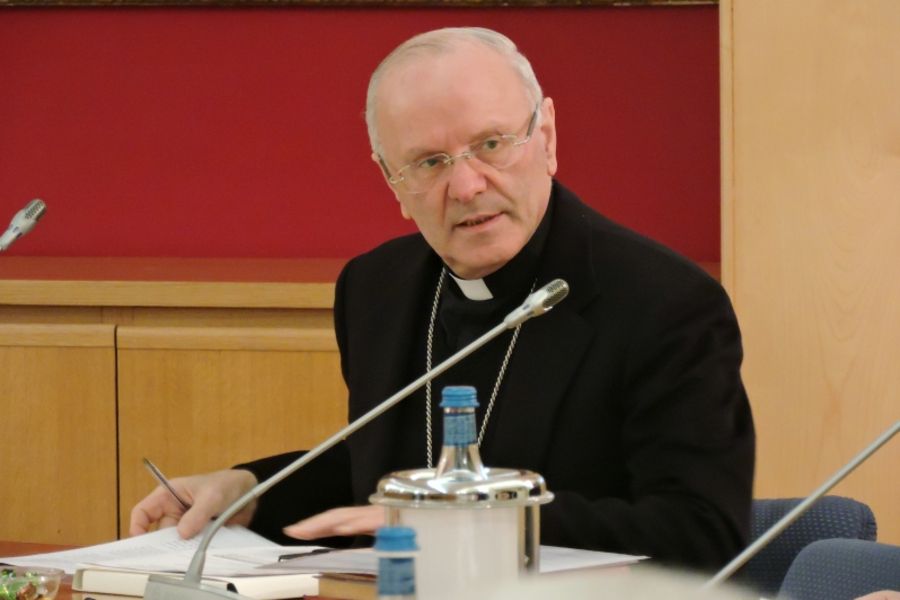Pope Francis’ Seismic Shift of the Secretariat of State
COMMENTARY: The move to remove the financial authority of the Vatican department vindicates the financial reforms first undertaken by Cardinal George Pell.

There was a major bureaucratic earthquake in the Roman Curia, reducing to rubble the powerful Secretariat of State’s administrative prestige and financial authority. One man though is standing tall, Cardinal George Pell.
Cardinal Pell is on a roll, all the more remarkable as he is now in retirement. His financial reforms are moving ahead at full speed, indeed more quickly and more far-reaching than when he was in office as the prefect of the economy under Pope Francis.
When the Holy Father defenestrated Cardinal Angelo Becciu, the former sostituto or second-in-command at the Secretariat of State, on suspicion of financial misconduct in September, it was widely viewed as a vindication of Cardinal Pell’s transparency and accountability initiatives. Cardinal Becciu had blocked Cardinal Pell’s measures for several years with considerable success. At the time, the Holy Father backed Cardinal Becciu in his conflict with Cardinal Pell. Now, even though the Australian cardinal is in retirement at age 79, the papal winds have shifted in his favor.
Just weeks ago, at the time of Cardinal Becciu’s firing, it was not known how strong those winds were blowing. Now it is.
The news came in an unusual statement from the Holy See Press Office on Nov. 5. It related blandly that the Holy Father had convened a meeting of the Secretary of State, Cardinal Pietro Parolin, the new sostituto Archbishop Edgar Peña Parra, Bishop Nunzio Galantino, the president of APSA, and Father Juan Antonio Guerrero Alves, Cardinal Pell’s successor as prefect of the Secretariat for the Economy.
APSA — from the Italian acronym for the patrimony of the Apostolic See — holds the Holy See’s real estate and other assets, as well as serving a payroll and personnel office.
The meeting was not routine, but was requested in an absolutely extraordinary letter addressed by the Holy Father to Cardinal Parolin on Aug. 25. In that letter, Pope Francis did what Cardinal Pell had proposed years ago, namely to remove the Secretariat of State’s status as an independent financial center. It will continue as the Curia’s chief administrative secretariat, but it will no longer have any financial independence or autonomy.
While the Holy Father’s proposed new overall structure for the Roman Curia has been stalled in its implementation, the letter of Aug. 25 is of far greater significance in how the Roman Curia operates.
The meeting this week was to coordinate the implementation of that letter, to be achieved within three months — basically overnight given the usual pace of Vatican bureaucracy. It is clear now, with this decision capping a year of vigorous financial reforms, that Pope Francis chose to accelerate internal Vatican financial reforms while the pandemic forced him to curtail other activities.
Pope Francis mandated two significant reforms in his Aug. 25 letter.
First, the Secretariat of State must transfer all of its financial holdings — real estate, investments, cash reserves — to APSA. It will no longer have an independent source of funds or assets to manage. The proximate reason given by the Holy Father’s letter is the bungled real estate development in London, which appears to have cost the Vatican tens, perhaps hundreds, of millions of euros, though some of that may be recouped if real estate values rise.
Independent of the financial exposure, the Holy Father’s letter spoke of the “reputational damage” such scandals bring to the Church and her mission.
The second significant reform is that the Secretariat of State will no longer make its own budget and oversee its own operation. Like all other curial departments, it must now submit a budget to the Secretariat for the Economy for approval, and be subject to its oversight and auditing procedures.
It is a massive vote of papal non-confidence in the current management of the Secretariat of State, and a radical change in the way the Vatican has organized its financial affairs.
Such a far-reaching reform, initially rejected when Cardinal Pell proposed it five years ago, has now come to pass due to the London real estate scandal which brought to light to grave systemic mistakes.
“The first [mistake] is to trust, with complete confidence, [outside investment] managers without any control by the Secretariat of State,” Bishop Galantino told the official newspaper of the Italian bishops, Avvenire. “The end result of this way of doing things clearly constitute a mistake. … The second mistake is that up to now, the Secretariat of State was subject to little obligation in reporting nor was it made to ask for any authorization for acts of extraordinary administration as other [curial departments] are required to do.”
Bishop Galantino, speaking less than a week before the Aug. 25 letter was released publicly, clearly believes the new measures will correct those mistakes. That remains to be seen, but Pope Francis has chosen the most dramatic option possible to prevent another such scandal in the monies (soon-to-be formerly) handled by the Secretariat of State. He has, in effect, closed their bank accounts and seized their assets. Henceforth, they will have to ask for what they need — and they may not get it.














